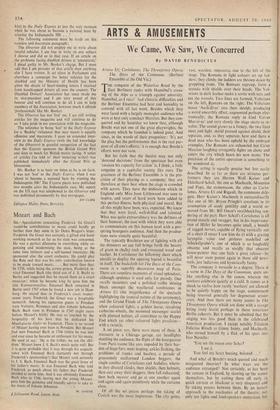Mozart and Bach
SIR,—Speculations concerning Frederick the Great's would-be contributions to music could hardly go further than they seem in Sir Denis Brogan's letter. Frederick the Great was certainly a gifted and hard- working monarch as far as his state was concerned. He was a perfect dilettante in everything while or- ganising and modernising the state, being at the same time imitator and a self-named innovator. He sponsored also the court orchestra. He could play the flute and that was his only contribution known to be made toward music. . . . But more than that. In 1738, while being the crown prince, Frederick in- vited Emanuel Bach (the third son of J. S. Bach) to Berlin and suggested that he stayed there as a court musician: when he became king he gave him the title Kammennusikus. Emanuel Bach remained in Berlin until 1767 when he found a new job in Ham- burg. He stayed thus in Frederick's court twenty- seven years. Frederick the Great was a hospitable monarch. Among his numerous guests to Potsdam were Voltaire, Rousseau and also Johann Sebastian Bach. Bach went to Potsdam in 1747 (eight years before Mozart's birth). He was so touched by the hospitality of his host that he dedicated his Musikalische Opfer to Frederick. There is no record of Mozart having ever been in Potsdam. But Mozart .had seen Emanuel Bach in 1766 (when he was ten) and ever since he became an enthusiast for his music. He used to say: `He is the father, we are the chil- dren.' Mozart knew J. S. Bach's music quite well. But it is quite probable that it was through his acquain- tance with Emanuel Bach (certainly not through Frederick's sponsorship!) that Mozart took seriously to J. S. Bach. Emanuel Bach was the great lover of his father's music. It was Emanuel Bach who told Frederick so much about his father that Frederick decided to invite him. And it was obviously Emanuel Bach who in 1766, having met the young Mozart, gave him the guidance and friendly advice to take to the music of Johann Sebastian.
3 Selbourne Road, Luton, Beds.
W. DIMENT






























 Previous page
Previous page